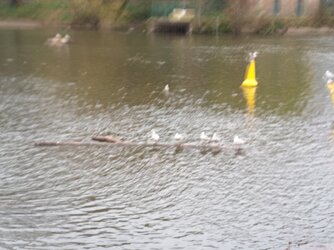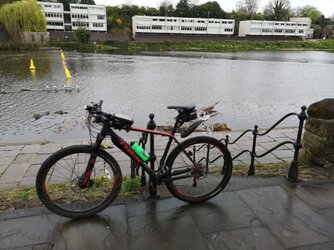Scenes from Portugal
"It was alright here until you arrived".
I can't argue with that. It was. We have dragged a damp duvet of stratus and drizzle with us from Cornwall all the way down to the Algarve. Long days of travel in a 22 year old motorhome that rattles and rolls and is reluctant to climb hills; I know I often feel the same. I have a superstition that when I look forward too much to something, dream too often of empty winding roads, far reaching views, clear skies, the gentle spring warmth of Southern Europe on my face, I will be disappointed. And so far I am.
There has been a drought in southern Portugal and Spain. A warm, sunny winter that no one can remember being so dry. Trees are bare of leaves not because it is winter time but because they have died. Cows and sheep scratch miserably on shrivelled meadows. There is a boniness to the land, the water drained away leaving dry ditches, drooping rushes and dust.
Until we arrive.
It doesn't rain every day or all day. There are three days out of March when the sun appears and we get some sense of how warm it should be now. Apart from the day when Saharan dust made the world orange, we had some clear skies with just a thin skein of cloud on the edges. But it is never warm enough to want to bare arms or legs and this is an issue because we only brought shorts and the arm warmers were more for sun protection than fending off winter draughts. I am cold all the time, shivering except when moving.
We try to ride most days, leaving the van on the site outside Praia de Luz ( famous for the abduction of Maddie McCann eighteen years ago as people keep reminding me in texts) and looking for quiet roads. I can see that the rides could be good and I have photos of the good days to confirm that. The traffic outside the towns is light, the roads rise up through scattered woodland into rolling hills capped by wind turbines. There are hamlets perched on hilltops, cobbled streets that wind crazily and sometimes impossibly steeply between 13th century houses. We ask ourselves where the cars are. The streets, if a small cobbled gap between stone houses can be described as a street, are empty of people and vehicles. Windows shuttered. I say "Bon Dias" to the few people I see but rarely get more than a nod in return.
After ten days on a busy site, the swimming pool full (indoor, heated) of children who are being home schooled by people who are clearly living in their vans here all winter, the constant stress for me of being observed, of being in the middle of strangers, we have had enough. I don't like being parked a few metres away from other vans and the scraggly hedge that separates us is insufficient to make me feel hidden away from sight, safe or secure. I like people, but only in small doses. It is time to head off again.
Our decision to leave is sealed by the worst ride of the whole trip. The forecast is showers but the sky is half blue as we leave the site and head for the hills. I take a rain cape and a second layer just in case. I feel optimistic. Madame Crow wants photos of her next to orange trees and lemons in the road and I notice that the sky is darkening. I fear another showery day but we continue anyway on empty roads that switchback through scrubby trees, climbing uphill and the views opening up on all sides, the road a thin thread below us. We reach a lake and now the sky is more black than blue. I take a photo of Madame Crow and we chat to some German cyclists who are doing the same route as us. They are pulling on waterproofs, seriously thick ones. The first drops appear, wetting my shoulders, drumming gently on my helmet. I am breezy and confident as I tell my wife that it is just a shower and will pass. We press on and so does the rain, more heavily, the road slicked now with runoff, legs wet from spray. Madame Crow complains that she is getting a wet arse and this is my fault for not putting on her mudguards. I thought this was a sunny cycling holiday.
'You have your mudguards on' she points out and its true I have because I was too lazy to take them off. She pretends to understand that I cannot remove my guards and put them on her bike but I know she doesn't believe me.
Our shoes are full of water now, legs goose pimpled and blue, clothes soaked beneath our 'shower proof' tops. I am shivering with cold, shoulders hunched and cycling as fast as I can to maintain a flicker of core warmth.
"I am sure it will pass".
Even as I say it the storm intensifies to Hollywood rain, singing in the rain type of rain, fire hose rain. It is 25k home or 30k to finish the ride. It's an easy decision even if its uphill again to get back to the lake. The road has a thin layer of water that soaks us from below, matching the hammering from above. Visibility is poor, a world of mist and wet and cold. We finish the quiet lanes and pass through the town, traffic close, waves of water washing the bikes, leaving us gritty as well as soaked. It is a horrible ninety minutes. The van fills with wet clothing, shoes that won't dry out for days, a thick fug of dampness against the roaring of the gas fire. I never thought we would need to light that fire.
"I think it might rain". Prophetic words
And so we leave and head north through more rain and greyness, a Portugal submerged, dripping, uncomfortably damp. A morning spent watching the big wave surfing at Nazare and the skies begin to clear. We are both wearing the thick coats we took for the ferry crossing but there is a hint of a promise in the sky.
I decide I like north Portugal more. The campsite we find is empty, the owners close the gate after we drive in and padlock them. It seems worrying but we can still squeeze out on bikes. It is like spring in Cornwall here, cool, cloudy and threatening to rain but never actually getting round to it. I love the scenery, the emptiness, The rock here is granite like Dartmoor but the hills are more like mid Wales in height and loneliness. The hamlets we pass through are cobbled, sometimes a mile of cobbles rattling fillings and fittings, the bike shaking in ways it has never shaken before. "You don't need to go all the way to Belgium for cobbles" I tell Madame Crow and she points out that Belgium is significantly closer to home than we are here.
Will it rain? Again....
Some of the hills are terraced, narrow shelves of vines pointing towards where the sun will be after we leave. This is the wine growing centre of Portugal, the Douro valley. This is the home of port, for which we have developed a taste in the solitary evenings playing rummy and scrabble. We sexagenarians know how to live it up.
Lots of hills...
On and on then, heading north up through Spain and reaching for Santander, the gateway to home. The sun must know we are leaving because it appears and the air is warm, the sky clear and blue, the sea almost inviting. Except we now have colds, or Portuguese Flu as I insist it should be known, snuffling snot and wheezing but still determined to ride.
The last day.....
The day for home arrives, the long queue for the ferry, the gentle rocking of the boat as I lie sleepless and let the scenes from the weeks away play through my mind. Well it was an adventure...I guess.
Remember the sunny days!







